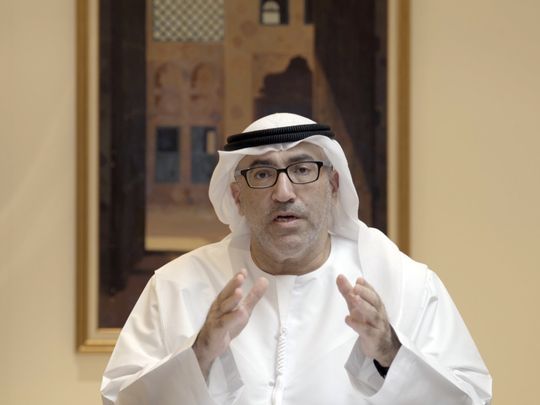
Dubai: Quick thinking, full preparedness at the first signs of a health crisis, extensive testing, great public-private partnership and above all, solidarity and cooperation from a community with 200-plus nationalities, are some of key factors that have helped the UAE stay ahead of the curve during the current pandemic, according to Abdul Rahman Al Owais, the UAE Minister for Health and Prevention.
Speaking at the Virtual Health Forum of the World Government Summit’s online series on COVID-19 and Government on Monday, Dr Owais said: “It’s the first time in history when the world has had to get together to defend humanity against one single enemy. The biggest lesson learnt so far is that we are one humanity and none of us is safe until all of us are safe. The pandemic has also given us a wonderful opportunity to get together, revise our priorities and put focus on the health sector.”
Diverse strength of UAE
Dr Owais pointed out that the UAE’s cultural, religious and national diversity has worked to the advantage of the country. He said, “The secret to our battle was the coexistence of 200-plus nationalities in our society. We have learnt it from our wise rulers. A short while ago, His Highness Sheikh Mohammed bin Rashid Al Maktoum, Vice-President and Prime Minister of the UAE and Ruler of Dubai, said where there is a challenge, there is an opportunity. At the very outset of this crisis, His Highness Sheikh Mohamad bin Zayed, the Crown Prince of Abu Dhabi and Deputy Supreme Commander of the UAE Armed Forces, reassured the people that everything was under control and everyone would be taken care of.”
Dr Owais praised the participation of community members in combating the pandemic. “Everybody was so amazing, standing side by side with their brothers and hopefully, we are getting to a brighter place (in terms of low infection incidence and high rate of recoveries).”
Early action plan helped
In terms of preparedness, the UAE acted early and was able to quickly convert huge exhibition centres into field hospitals. It set up quick drive-through centres for testing that helped in early diagnosis, contact tracing and isolation of patients displaying an efficient contingency plan, said Dr Owais.
“While most countries have a contingency plan in place for all kinds of crises, I don’t think anyone in the world was prepared for what it is currently going through,” he added.
He said, “In the UAE, we were tracking the situation with our meetings from the first week of January, even before WHO announced there was something serious going on in China. We started planning even when things were not clear. We worked on methodology, approach and application of different ideas, taking quick decisions, guided by our dynamic leadership. One of them was the success we had with our extensive testing. We completed three million tests which amounts to nearly one third of our population. This is a very high percentage, and we are still going ahead with our testing although the number of infections is going down, because we want to secure our nation.”
Dr Owais also added that as the world struggled with a global shortage of medicines, Personal Protective Equipment (PPE) and other medical supplies, the UAE was able to send these supplies to needy countries.
Misinformation a challenge
He said one of the key lessons that the UAE learnt during the pandemic concerned the impact of social media. “The disinformation from social media was so challenging and we had to be very quick in responding to that. We are still learning how to utilise the full power of social media. Disinformation created a mess that put a great burden on the government. I think we need to discuss how to maximise the benefits from social media,” he noted.
Dr Owais stressed that the battle was far from over and there were important takeaways for the country. “The two most important sectors in society are health and economy. People can go through difficult times, but you cannot force them through even more difficult times. So we have to balance both and continue with life. We have to learn to adjust to the new normal – wearing masks, social distancing, temperature checks … Of course, the advantage we have today is that we know more about the virus than we ever did earlier.”
Other speakers
Dr Mansour Habib, family medicine and occupational health consultant, senior director of employee health and wellness at the UAE telecommunications company, du, mediated the panel discussion. Dr Tedros Adhanom Ghebreyesus, Director General of the World Health Organisation (WHO) presented the keynote address. Other panelists included Lena Hallengren, Health Minister of Sweden, Bent Hoie, Health Minister of Norway and Dr David Nabarro, Special UN secretary General for Food Security and Nutrition.








